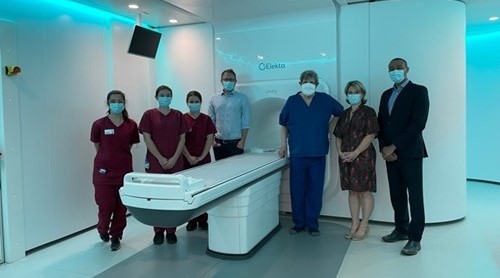A lung cancer patient has become the first in the UK to benefit from a ground-breaking radiotherapy treatment at The Christie NHS Foundation Trust.
Barry Staniforth, 81, was treated using the Elekta MR-guided linear accelerator (MR-linac) machine which performs real-time MRI scans while X-ray beams target the tumour.
The treatment forms part of the MOMENTUM trial – a global radiotherapy trial which uses the MR-linac - which aims to target a variety of different cancers in the hopes of discovering which react best to the treatment, before rolling it out worldwide.

Dr Ahmed Salem, The Christie Hospital, said “the MR-linac’s unique ability to provide real time scans of the tumour and healthy tissues while treatment is being delivered provides an opportunity to improve radiotherapy accuracy and reduce side-effects in selected patients.”
By targeting tumours more specifically, the surrounding healthy tissue is avoided, consequently reducing unwanted side effects, as well as treatment times.
The MR Linac combines two technologies – an MRI scanner and linear accelerator – to accurately locate tumours, customize the shape of X-ray beams in real time and accurately deliver doses of radiation to moving tumours.
One of the major challenges in modern radiotherapy research was combining the highly precise soft tissue contrast of MRI scanning with precision radiotherapy in a single treatment.
Following trials, the system has shown that MRI Linac system can be calibrated to deliver precise X-rays in the presence of the distorting magnetic field, which is used to generate MRI images, thus overcoming a major scientific challenge.
The treatment is effective for cancers which move during radiotherapy or change position between scanning and treatment, such as breathing, bladder filling and bowel changes. Some examples include lung, cervical, prostate, bowel and bladder cancer.
Professor Robert Huddart, Consultant Clinical Oncologist at The Royal Marsden, said “by seeing the tumour as we aim the radiation at it better, we can be more confident of a direct hit.”
He added, “we should ultimately be able to attack the tumour with a higher dose of radiation each time, meaning we can treat some patients which are currently difficult to treat effectively.”
The Christie is now one of only 2 sites worldwide which offers this innovative treatment, alongside the first NHS high energy proton beam centre, which opened in 2018.
The machine is worth £5.3m and was part-funded through donations to The Christie charity, and will revolutionise the future of radiotherapy treatment.



















